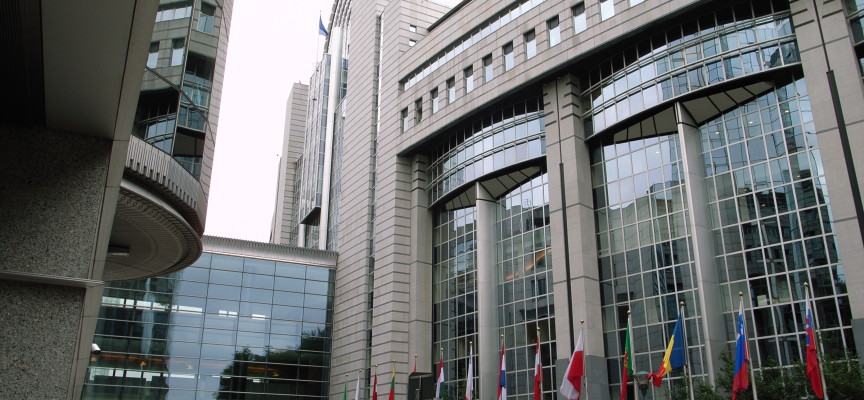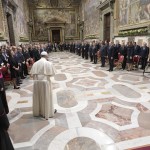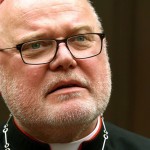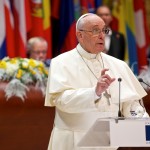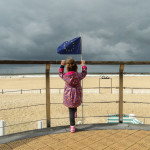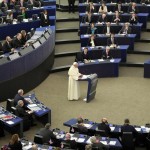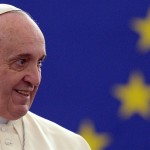Europe looks at Pope Francis, who tomorrow will speak to the European Parliament in Strasbourg and then also in front of the Council of Europe. Already before the event there has been much speculation about the topics that the Pope will address. Cardinal Secretary of State, Pietro Parolin, hinted that for Pope Francis issues of solidarity are primarily important: with the unemployed young, with single mothers, with the elderly and the disabled, but especially with those people who are looking for “new opportunities outside their country”, that is the refugees who were already the subject of the first papal visit to Lampedusa. Parolin said literally: “Solidarity is not only one of the values of a united Europe, but the real purpose of the existence of Europe, and certainly one of its basic dimensions”. Even the “protection of creation” might play an important role in the words of the Pope. However, before you even know what Pope Francis will say in Strasbourg, his journey has a very special character for many reasons.
– The flag bearers of secularism and anti-clericalism, become fashionable again after 1989 (since there was no longer “need” of Churches as a bulwark against communism), are a bit astonished. Somehow do not fit to the big talks about the crisis of the Church and the farewell of Europe to Christianity the words of the President of the European Parliament, Martin Schulz (absolutely not an observant person), a day before the arrival of the Pope: “The Pope’s words have enormous importance.” The Pope would offer guidance to people “far beyond the scope of the Church”. At the same time Schulz also said that it belongs to the mission of the Church “interfering” in the political and economic fields.
– In his person Pope Francis makes clear that a Europe focused on itself, which entrenches itself, makes no sense. In southern Europe you will understand this more intensely than in other parts of the continent: a resident of Madrid feels more at home in Buenos Aires and Lima, Santiago and Bogota than in Vienna, Berlin or Warsaw. This Pope is also uncompromising in his opposition to a “fortress Europe”, which tries with the technical means of the 21st century to revitalize the historical models failed, as the “Limes” of the Romans and the Great Wall of China.
– When the shadow of Yalta and then the division of Europe has become pale, Mikhail Gorbachev, the last president of the Soviet Union, imposed himself with the slogan of the “common European home”. For a few years everyone seemed to have actually the same possibility of living together in the same building; of this almost nothing is left. In connection with the crisis in Ukraine – exactly in coincidence with the 100th anniversary of the explosion of the great European catastrophe of the First World War! – there is again a warmongering rhetoric absolutely disgusting and distasteful. Pope Francis makes it clear in many gestures that Europe is larger than the ”island of prosperity”.
– Finally, the visit to Strasbourg has a special significance also for the fact that within a few days the journey to the Bosphorus for the feast of the patron saint of the Church of Constantinople will follow. Coincidence? But what does this mean? Pope Francis transfers into facts the word of his pre-predecessor on the two lungs – the western and eastern Europe – with which Europe needs to breathe. One might add that he also recalls the unity of the Mediterranean area, which is the true cradle of European civilization.
L’Europa guarda a papa Francesco che martedì a Strasburgo parlerà al Parlamento europeo e poi anche davanti al Consiglio d’Europa. Già prima dell’evento c’è molta speculazione sugli argomenti che il Papa affronterà. Il cardinale segretario di stato, Pietro Parolin, ha fatto capire che per papa Francesco contano soprattutto le questioni di solidarietà: con i giovani disoccupati, le madri singole, gli anziani e i disabili, ma soprattutto con quelle persone che cercano “nuove opportunità al di fuori del proprio Paese”, cioè i profughi che già erano oggetto della prima visita del Papa a Lampedusa. Parolin diceva letteralmente: “La solidarietà non è soltanto uno dei valori di un’Europa unita, ma il vero scopo dell’esistenza dell’Europa, e certamente una delle sue dimensioni di base”. Anche la “salvaguardia del creato” giocherebbe un ruolo importante nelle parole del Papa. Comunque, prima ancora di sapere quel che dirà papa Francesco a Strasburgo, il suo viaggio per più ragioni ha un carattere davvero speciale.
– I portabandiera del laicismo e anticlericalismo divenuto di moda nuovamente dopo il 1989 (siccome non si aveva più “bisogno” delle Chiese come baluardo contro il comunismo) sono un po’ attoniti. In qualche modo non si adattano ai grandi discorsi sulla crisi della Chiesa e sull’addio dell’Europa al cristianesimo le parole del presidente del Parlamento europeo, Martin Schulz (assolutamente non un “osservante”), un giorno prima dell’arrivo del Papa: “Le parole del Papa hanno un enorme importanza”. Il Papa offrirebbe orientamento anche alle persone “ben oltre l’ambito della Chiesa”. Nello stesso tempo Schulz ha detto anche che appartiene alla missione della Chiesa “interferire” negli ambiti politici ed economici.
– Nella sua persona papa Francesco rende chiaro che un’Europa concentrata su se stessa, che si trincea, non ha senso. Nell’Europa meridionale si capirà questo più intensamente che in altre parti del continente: un residente di Madrid si sente più a casa sua a Buenos Aires o Lima, Santiago del Cile o Bogotà che non a Vienna, Berlino o Varsavia. Questo Papa è anche intransigente nella sua opposizione a una “fortezza Europa”, che tenta con i mezzi tecnici del 21° secolo di rivitalizzare i modelli storici falliti come il “Limes” dei Romani e la Grande Muraglia cinese.
– Quando l’ombra di Yalta e quindi la divisione dell’Europa è diventata pallida, si è imposto Mikhail Gorbaciov, ultimo presidente dell’Unione Sovietica, con lo slogan della “casa comune europea”. Per alcuni anni sembrava che tutti si potrebbero effettivamente accasarsi nello stesso stabile; di questo quasi nulla è rimasto. In connessione con la crisi dell’Ucraina – esattamente in concomitanza con i 100 anni dell’esplosione della grande catastrofe europea della prima guerra mondiale! – c’è di nuovo una retorica guerrafondaia assolutamente schifosa e disgustosa. Papa Francesco fa capire in tanti gesti che l’Europa è più grande dell’”isola di prosperità”.
– La visita a Strasburgo ha infine una speciale importanza anche per il fatto che seguirà a distanza di pochi giorni il viaggio al Bosforo per la festa del santo patrono della Chiesa di Costantinopoli. Coincidenza? Ma cosa vuol dire. Papa Francesco trasferisce nella realtà la parola del suo pre-predecessore sui due polmoni – occidentale e orientale – con cui l’Europa ha bisogno di respirare. Si potrebbe aggiungere che egli richiama anche l’unità dell’area mediterranea, che è la vera culla della civiltà europea.
Erich Leitenberger
Spokesman "Pro Oriente" Foundation, Austria
Latest posts by Erich Leitenberger (see all)
- A special journey - 24 novembre 2014
- A day of deep mourning - 29 luglio 2014
- Some fresh air for Europe - 17 giugno 2014

